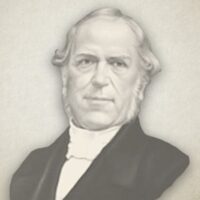
12 Examples Of Confusion In Duty Faith Pronouncements
Duty faith unto salvation says in the Midland Counties Association, that the power of salvation lies sufficiently in religious means; but the Bible faith says, that the power of salvation lies alone in God the Saviour, sovereignty and severally as he will, Matt 7:13; 2 Cor 4:7; 1 Cor 12: 2.
Duty faith in Mr. H., treating a spiritual state with disdain, as the mere invention of fancy, says, that the natural man can know and receive the things of the Spirit, and that the common intellect of man is sufficient of itself savingly to comprehend all such things; but the faith of the Bible says, ‘What man knoweth the things of a man, save the spirit of man that is in him? Even so the things of God knoweth no man, but the Spirit of God. But the natural man receiveth not the things of the Spirit of God, for they are foolishness unto him; neither can he know them, because they are spiritually discerned. But God hath revealed them unto us by his Spirit,’ I Cor 2: 2,14,10.
Duty faith in Mr. H., Sudbury goes on to say, that God had committed the salvation of the world into the hands of the church, and of the ministers, and that the ministers and the church are responsible for the salvation of the world. If this were true, such men as Mr. H. would be the most accursed wretches under the sun, if they did not save every one living all around about them. But do they labor to do so? Not a bit of any thing of the kind. But is such faith the truth? No; for the Bible faith of the gospel says, ‘Who then is Paul, and who is Apollos, but ministers by whom ye believed, even as the Lord gave to every man? I have planted, Apollos watered; but God gave the increase. So, then, neither is he that planteth any thing, neither he that watereth; but God that giveth the increase,’ 1 Cor 3: 5-7.
Duty faith in Mr. W N., says, that it is the duty of the natural man by absolute command, to believe unto salvation, and, consequently, to come savingly to Christ; but the faith of the gospel of Christ says, ‘No man can come to me except the Father which sent me draw him, John 6: 44. ‘Therefore said I unto you, that no man can come unto me, except it were given unto him of my Father, John 6: 65.
The gospel of Christ in the world is according to what Christ himself was in the world, and nothing contrary; and the faith of the gospel says, that Christ is ‘harmless,’ Heb 7:26; ‘Came not into the world to condemn the world, John 3:17; and will not be an accuser to the Father, saying, ‘Do not think that I will accuse you to the Father, there is one that accuseth you, even Moses, in whom ye trust, John 5:45. But duty faith in a Mr. James, who was co-pastor with an old minister of the duty faith mixed communion Baptist Church at Devizes, in the year 1817, denies this testimony, and sets up the contrary altogether; for after some considerable conversation, in which of course, we did not agree, Mr. James plainly said, ‘The Lord has so altered the dispensation of things, as that he does not condemn any man by the law, but sends them the gospel of his salvation, and that if they do not believe and receive that unto salvation, they shall be damned for not believing. I said in reply to this, that the people would do very well as they are, but to send them the gospel was at once to put them in danger of damnation, if this were the truth. The apostle rejoiced that through divine wisdom, mercy and power, he had not frustrated the grace of God, meaning the gospel, nor made void the law; but had maintained both ministries in their due and distinct nature and order, Gal 2:21; Rom 3: 31. But not so Mr. James, for he confounds both. And to my apprehension, duty faith does really and indeed make void the law, and turns the gospel of the grace of God into law – conceals the pure favor of God – denies the sovereignty of the divine will in the gift of eternal life – makes the promises of God conditional, denying their being all yea and amen in Christ, to the glory of God the Father – turns the purposes of God which he hath purposed in himself, Eph 1: 9,10, into mere proposals to man – makes out God to will and desire, as to numbers, a larger salvation of sinners from his own wrath to come, than his own love, grace, and arm of his power will ever effect; instead of his working all things after the counsel of his own will, Eph 1: 11, doing what his soul desireth, Job 23: 13 – sends men to hell for not going to heaven by grace – makes man, though a sinner, to have the option of his own will over his own eternal state, and God not to determine, but to wait the final issue, with a kind of would be gracious to whom he could; denying him the entire will to be gracious to whom he will be gracious,’ Rom 9: 15; Ex 33: 19; and also denying the fact, that ‘he hath mercy on whom he will,’ Rom 9:18, 22-24.
John Foreman (1792-1872) was a Strict and Particular Baptist preacher. He was appointed the Pastor of Hill Street Chapel, Marylebone, serving this position for close to forty years.
JOHN FOREMAN'S LIFE AND MINISTRY
JOHN FOREMAN ON DUTY FAITH (COMPLETE)
JOHN FOREMAN'S BAPTISM AND COMMUNION CONSIDERED (COMPLETE)




